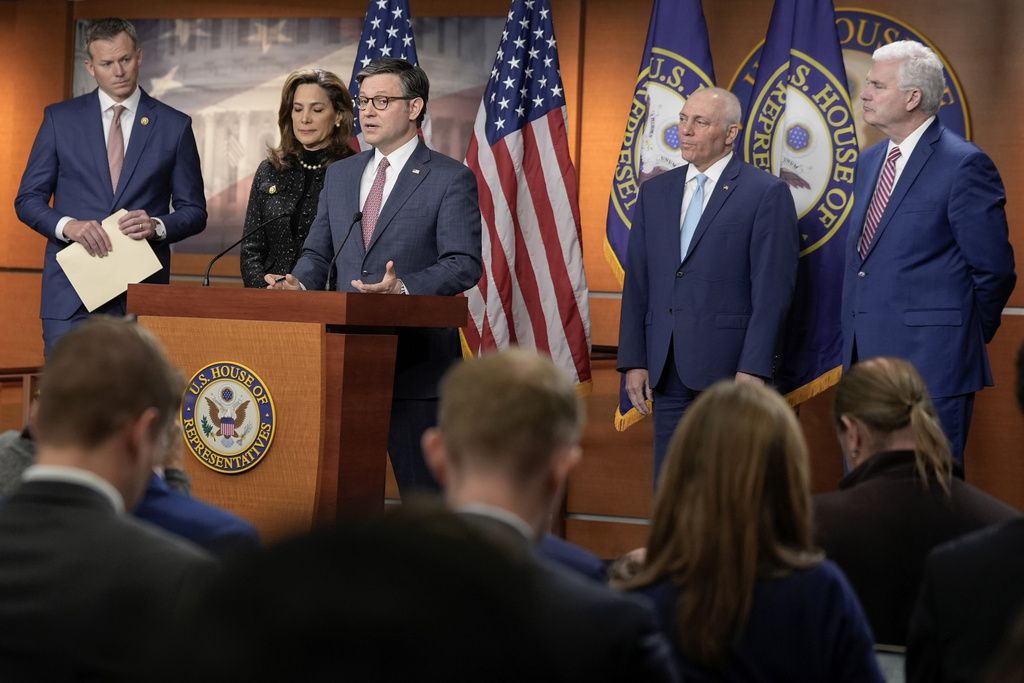

The House is poised to vote on two contempt resolutions against Attorney General Merrick Garland as early as next week, but Republicans are already preparing alternatives if the Justice Department declines to bring criminal charges against its leader.
Both the House Judiciary and Oversight Committees passed the measures on Thursday that hold Garland in contempt of Congress for not turning over the audio recording from President Joe Biden‘s interview with special counsel Robert Hur despite handing over the transcript from the conversation. The measures now head to the House floor for a full vote as early as Tuesday, when the chamber is back in session.
When the bill comes to the floor is unknown, but it is up to House GOP leadership to schedule the vote. The Washington Examiner reached out to Majority Leader Steve Scalise (R-LA) for comment.
The contempt resolution against Garland is part of a larger impeachment inquiry into Biden, whom Republicans claim improperly benefitted from his family members’ foreign business dealings. So far, they have provided little to no evidence of these allegations.
A vote on the contempt resolution is Speaker Mike Johnson’s (R-LA) next hurdle to overcome as he tries to navigate a one-seat majority and a small group of hard-line conservatives who have pushed back against his leadership since he took the gavel. Johnson recently survived a motion to vacate effort, after House Democrats joined most Republicans to table the motion to oust him.
Even with a one-seat majority, Johnson has a larger numbers problem: Many of his GOP members represent Biden districts or are centrist Republicans fighting in competitive primaries and general elections this November. A lawmaker told Axios in February that there are already “easily 40-50” Republicans who are likely to vote against the impeachment.
If the resolutions somehow pass the full House, a criminal referral will then be made to the U.S. attorney’s office in Washington, D.C., which must then weigh whether to move forward with prosecution. However, it is unlikely to result in any criminal proceedings for Garland, who heads the DOJ.
Republicans prepare a backup plan
Ahead of Thursday’s contempt markups, the Justice Department announced Thursday morning that the president was asserting executive privilege over the recordings — placing another roadblock in the way of House Republicans as they continue to argue with the DOJ over whether Congress should have access to the audio recording.
Because of Biden’s assertion of executive privilege, the chances of Garland facing criminal proceedings are slim to none. However, House Republicans have several alternative paths to take should the DOJ decline to follow through on the contempt resolutions.
One path is to allow the courts to decide whether executive privilege is a viable claim on behalf of the president. Judiciary Committee Chairman Jim Jordan (R-OH) told Politico that he thinks battling it out in the courts is “very likely.”
Some Republicans have criticized the president’s assertion of executive privilege as a political move, while some legal experts have argued that because Biden waived privilege with the transcript, it applies to the audio recording, as well. Oversight Committee Chairman James Comer (R-KY) echoed this thought to Politico, saying that GOP legal counsel is skeptical about the president’s claim.
“Hopefully we’ll find out if that’ll hold up in court very soon,” Comer said.
The parameters of executive privilege agreed by the DOJ and other institutions allow the president and his advisers to “discuss issues candily, express opinions, and explore options without fear that those deliberations will later be made public,” according to comments from public interest law professor John Banzhaf from George Washington University Law School shared with the Washington Examiner.
“But here those discussions and opinions have already [been] made very public,” Banzhaf noted. “The cat is out of the bag.”
Another route that GOP members may take is to take up a long-dormant House contempt power under a resolution from Rep. Anna Paulina Luna (R-FL). In May, she announced an “inherent contempt” resolution against Garland, which differs from the committees’ proceedings.
Luna’s resolution relies on the power to allow the House to detain and imprison someone until they comply with the congressional demand. Under the process, which hasn’t been used since 1935, the person being held in contempt could be arrested by the sergeant-at-arms and brought to the House floor for trial, and can be imprisoned or detained in the Capitol.
Luna’s office confirmed to the Washington Examiner that Luna’s resolution is still active. The Florida congresswoman spoke about her resolution during the Oversight hearing on Thursday night, which was moved from the early morning to later that night to accommodate Luna and other members’ trip to New York to be at Trump’s hush money trial.
“I fully intend to hold Attorney General Merrick Garland in inherent contempt of Congress if the DOJ does not do their job,” Luna said in a post to X late Thursday.
Recording sows divisions between political parties
During the Judiciary Committee hearing, Republicans declared the executive branch “doesn’t get to choose” what evidence they provide to the committee, while House Democrats blasted Republicans for politicizing the issue and wanting the audio recording for “Donald Trump’s campaign commercials” or use Biden’s stutter to “smear” him.
The White House has avoided responding directly to the political implications of the audio recording’s release. On Thursday, White House press secretary Karine Jean-Pierre said the transcripts are “already out there” and Garland made it clear “that law enforcement files like these need to be protected.”
“I don’t want to get into — dive into the specific point that you’re making about the politics,” Jean-Pierre said. “I would have to … refer you to our Counsel’s Office on that. But there were determination that the president took very seriously … at the request of the Attorney General. And that’s how this decision was made.”
Though Hur determined that the president’s conduct posed “serious risks to national security,” the special counsel wrote in his report that he did not charge Biden because he believed a jury would find him a “sympathetic, well-meaning elderly man with a poor memory” and likely not convict him for this reason.
GOP members during the Judiciary Committee hearing latched onto those lines quickly as evidence that the president is not mentally competent to serve as commander-in-chief, believing that the audio recording will shed light on Biden’s mannerisms, colloquialisms, and ability to answer questions.
CLICK HERE TO READ MORE FROM THE WASHINGTON EXAMINER
“That tape must be quite something if the administration of the president has decided to assert executive privilege to keep it from the committee in the course of an impeachment inquiry. Think about it,” Rep. Dan Bishop (R-NC) said. “The basis for withholding the audio recording, when the transcript has been furnished, must rest on something about the recording that is distinct from the information contained in the transcript.”
The Oversight Committee hearing Thursday dissolved into chaos, with Rep. Marjorie Taylor Greene (R-GA) trading insults and barbs with Reps. Jasmine Crockett (D-TX), and Alexandria Ocasio-Cortez (D-NY). Despite the late hour and long, drawn-out arguments, the committee passed its resolution, 23-19. The Judiciary Committee passed its resolution earlier in the day, 18-15.







